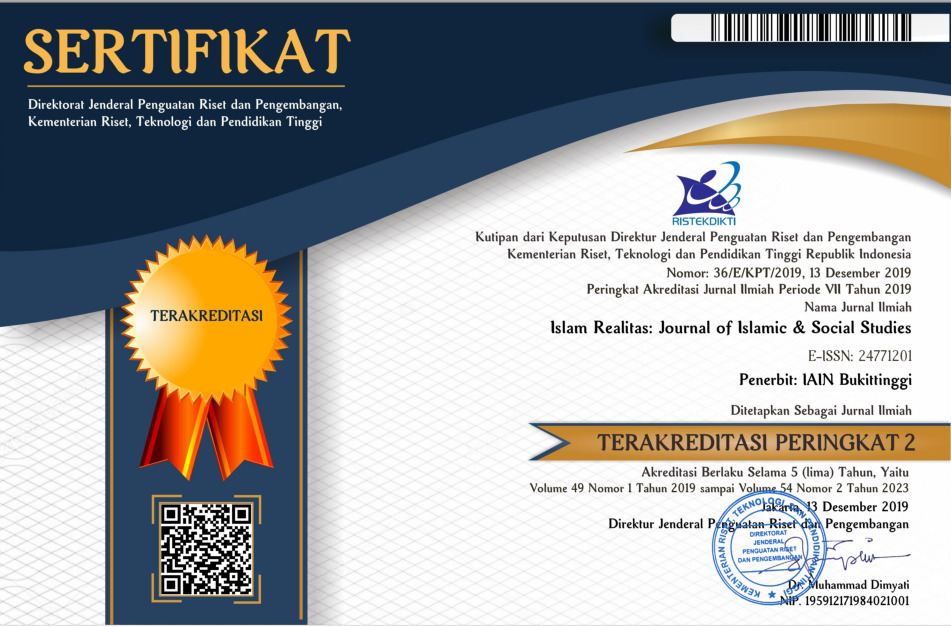The Strategic Role of the Da'i Nagari in Driving Rural Development in Pasaman, West Sumatra
DOI:
https://doi.org/10.30983/fuaduna.v7i2.7483Keywords:
Da’wah, Local Government, Da’i Nagari, Rural Development, Social TransformationAbstract
References
Al-Hakim, L., & Bachtiar, A. (2021). Dakwah Online dalam Perspektif Masyarakat Modern di Media Sosial Youtube. KOMUNIKATA57: Jurnal Ilmiah Ilmu Komunikasi, 2(2), 75–82. https://doi.org/10.55122/kom57.v2i2.265
Anwar, S. (2022). Melayu Islam dan Batak Kristen: Labelisasi Keagamaan Terhadap Identitas Kesukuan di Sumatera Timur pada Awal Abad Ke-20. Warisan: Journal of History and Cultural Heritage, 3(3), 82–92.
Arbn. (2021, August 20). Interview.
Aswadi, A. (2014). Refomulasi Epistemologi Hijrah dalam Dakwah. ISLAMICA: Jurnal Studi Keislaman, 5(2), 339. https://doi.org/10.15642/islamica.2011.5.2.339-353
Aziz, M. A. (2018). Netizen Jurnalisme dan Tantangan Dakwah di Media Baru. Islamic Communication Journal, 3(2), 121. https://doi.org/10.21580/icj.2018.3.2.3096
Basit, A. (2016). The Ideological Fragmentation of Indonesian Muslim Students and Da’wa Movements in the Postreformed Era. Indonesian Journal of Islam and Muslim Societies, 6(2), 185–208. https://doi.org/10.18326/ijims.v6i1.185-208
Dewi, E. (2012). Transformasi Sosial Dan Nilai Agama. Jurnal Ilmu-Ilmu Usuluddin Dan Filsafat, 128, 112–121.
Hatmansyah. (2015). Strategi dan Metode Dakwah Walisongo. Jurnal Al Hiwar, 3(5), 11.
Hefni, H. (2017). Makna dan Aktualisasi Dakwah Islam Rahmatan lil‘Alamin di Indonesia. Ilmu Dakwah: Academic Journal for Homiletic Studies, 11(1), 1–20. https://doi.org/10.15575/idajhs.v11i1.1438
Hutz, C. S., Midgett, A., Pacico, J. C., Bastianello, M. R., & Zanon, C. (2014). The Relationship of Hope, Optimism, Self-Esteem, Subjective Well-Being, and Personality in Brazilians and Americans. Psychology, 05(06). https://doi.org/10.4236/psych.2014.56061
Ika Selviana. (2019). Peran Estetika Dalam Dakwah Bagi Generasi Milenial. Ath-Thariq, 3(2). https://doi.org/https://doi.org/10.32332/ath_thariq.v3i2.1724
Iskandar. (2021, July 12). Interview.
Ismail, I., Haron, H., Nasir Ibrahim, D., & Mohd Isa, S. (2006). Service quality, client satisfaction and loyalty towards audit firms. Managerial Auditing Journal, 21(7), 738–756. https://doi.org/10.1108/02686900610680521
KLKS. (2021). Interview.
Llh. (2021, October 2). Interview.
M. Amn. (2021, September 3). Interview.
Moelong, L. J. (2016). Metodologi Penelitian Kualitatif. Rosdakarya.
Sarji, S., Yusuf, B. P., & Wibowo, A. B. (2021). The Role of Da’i Kamtibmas in Community Police Partnership Forum through Religious Moderation. Jurnal Fuaduna: Jurnal Kajian Keagamaan Dan Kemasyarakatan, 5(2), 207–217. https://doi.org/10.30983/fuaduna.v5i2.4776
Sfrd. (2021, September 1). Interview.
Sfrd Zkr, A. (2021, September 14). Interview.
Taufik, M., & Marh, N. F. (2018). Pesan Dakwah Melalui Musik Islami. FUADUNA : Jurnal Kajian Keagamaan Dan Kemasyarakatan, 2(1), 1. https://doi.org/10.30983/fuaduna.v2i1.2021
Downloads
Published
How to Cite
Issue
Section
Citation Check
License
Copyright (c) 2023 Desi Syafriani, et al.

This work is licensed under a Creative Commons Attribution-ShareAlike 4.0 International License.
Authors who publish with this journal agree to the following terms:
- Authors retain copyright and grant the journal right of first publication with the work simultaneously licensed under a Creative Commons Attribution-ShareAlike 4.0. that allows others to share the work with an acknowledgment of the work's authorship and initial publication in this journal.
- Authors are able to enter into separate, additional contractual arrangements for the non-exclusive distribution of the journal's published version of the work (e.g., post it to an institutional repository or publish it in a book), with an acknowledgment of its initial publication in this journal.
- Authors are permitted and encouraged to post their work online (e.g., in institutional repositories or on their website) prior to and during the submission process, as it can lead to productive exchanges, as well as earlier and greater citation of published work (See The Effect of Open Access).





